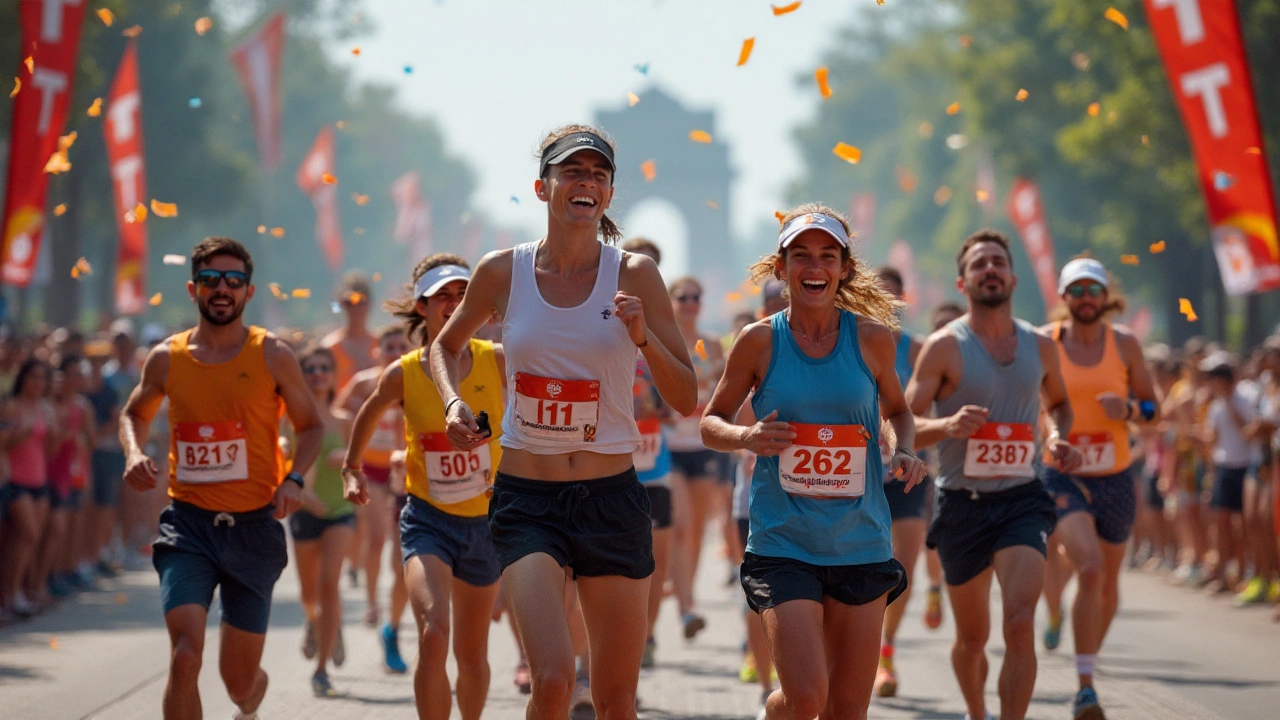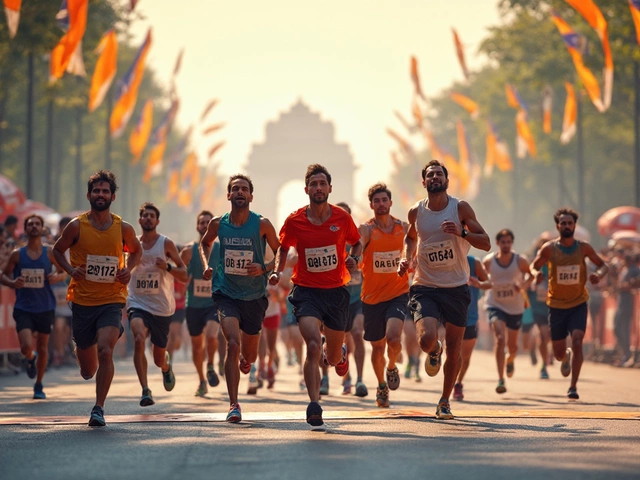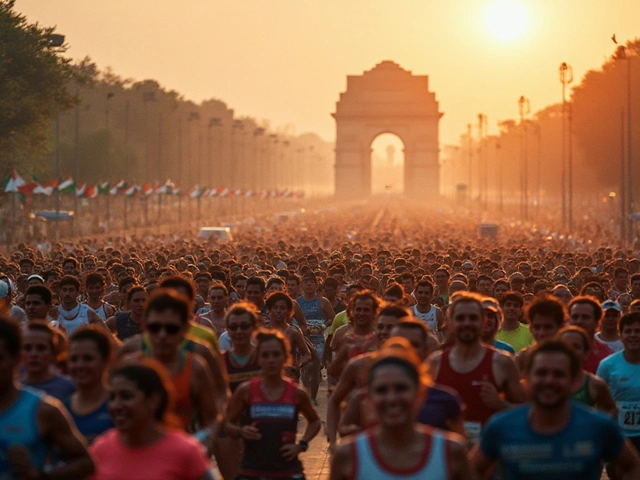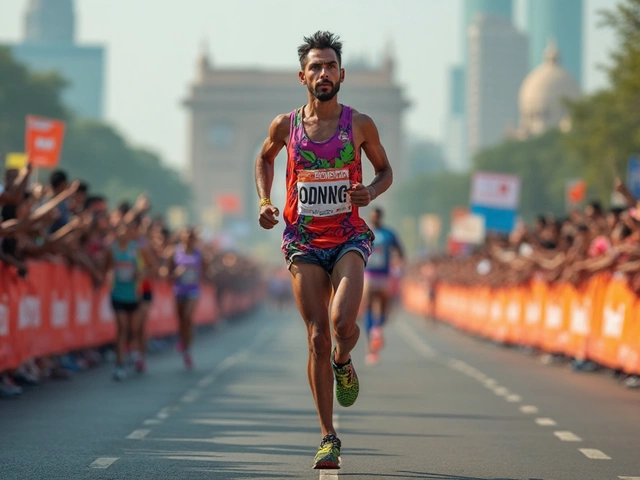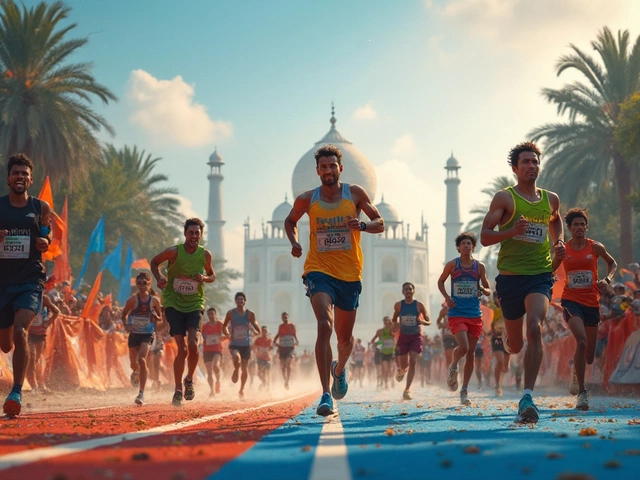Marathon running is not just a physical challenge; it’s often a journey of the mind and soul. Runners swear by the profound changes they experience, both during and after training. But does pounding the pavement for countless miles actually make one happier? This is a question many have pondered.
From the psychological highs known as ‘runner's high’ to the physical health benefits, marathon running might have several paths leading to increased happiness. While some runners feel an exhilarating fusion of energy and peace, others notice an overall uplift in their mood even when not in their running shoes.
The article ahead explores these dimensions. We look at psychological impacts, physical benefits, what science says about it all, and how runners can specifically train for happiness as much as for endurance. Whether you’re a marathon aficionado or a curious onlooker, this exploration into the runner’s world hopes to offer insights and perhaps inspire a new perspective on happiness itself.
- The Psychological Impact of Marathon Running
- Physical Health and Its Role in Happiness
- Scientific Studies on Runner Happiness
- Incorporating Happiness Strategies into Training
The Psychological Impact of Marathon Running
Marathon running does more than sculpt physical fitness; it significantly shapes the mind. Many who lace up their sneakers and hit the endless roads often speak about the transformative journey it offers beyond physical endurance. This journey often begins with the thrill of realizing what the human body is truly capable of when challenged over long distances. It turns out that chasing those 26.2 miles can actually be a path to a more enriched mental state.
A cornerstone of this mental transformation is self-discipline. As marathoners commit to their marathon training, they cultivate determination and tenacity, which often carry over into other areas of life. This heightened sense of self-control can contribute to a more ordered and focused lifestyle, ultimately fostering a sense of achievement and contentment. For many, long runs become a form of active meditation, providing clarity and an emotional release as rhythmic strides reset their minds.
There's also the acclaimed 'runner's high' – a euphoric state achieved through the engagement in prolonged physical activity. This sensation, as explored in various research, is attributed to a surge in endorphins, the body's natural mood elevators. This isn't just anecdotal. A study conducted by neuroscientists at the University Hospital of Bonn in Germany found that running significantly increased endorphin binding in the receptors of certain brain areas, correlating with improvements in mood. This is why many runners feel more peaceful and centered even hours after leaving the track.
According to a study published in the Journal of Clinical Psychiatry, 'Regular aerobic exercise, comparable to running, has proven to be as effective, if not more, than antidepressants in improving symptoms of mild to moderate depression.'
Social connection can also play a role in the mental benefits of marathon running. Joining a running group or participating in races provides a community, often resulting in friendships and shared experiences. The camaraderie established through shared goals and the mutual encouragement found in these circles nurture a sense of belonging and validation that boosts emotional wellbeing. It presents a kind of social cohesion that many find crucial, especially in today's digital age.
Marathon running also teaches resilience, particularly important for emotional health. Encountering and overcoming staggered barriers teaches patience and courage. As runners confront pain or fatigue and push past them, a psychological toughness develops. This ability to endure setbacks and move forward is a learned skill that profoundly impacts everyday stressors, promoting mental fortitude. The discipline of marathon training instills a resilient mindset, while unpredictable runs prompt adaptability and acceptance—key traits for mental sustainability.
Finally, goal-setting within marathon training often provides direction and purpose. Each small victory along the training journey fuels motivation and enhances one's sense of autonomy and power. Completing each mile, pushing through the mental walls, and savoring the eventual victory of crossing the finish line strengthens mental well-being. It's, in essence, a testament to human potential, a reminder of the satisfaction that comes with effort, and the joy of setting and achieving personal goals.

Physical Health and Its Role in Happiness
Physical health is undoubtedly linked to happiness, but how does marathon training fit into this picture? Marathon runners often report a heightened sense of well-being, and much of this can be traced back to the profound physical changes that occur through their demanding training regimen. When one runs extensively, the body undergoes a series of positive physiological transformations. Endurance running improves cardiovascular health, boosts immunological defenses, and enhances metabolic efficiency. This means that runners tend to have lower resting heart rates, more proficient lung capacities, and more adept glucose regulation. Such enhancements can lead to a lower risk of chronic diseases, like heart disease and diabetes, and a general increase in life expectancy.
Another significant factor is the release of endorphins — the so-called "happy hormones." During intense long-distance exercise, the brain produces these chemicals which interact with receptors in the brain to reduce the perception of pain and trigger a positive feeling in the body. This phenomenon, often referred to as the "runner's high," can induce a state of euphoria and leave runners feeling more energized and upbeat long after the run has concluded. The runner's high is not just a myth; numerous studies have documented significant endorphin release amidst long-distance training.
According to a report from the Mayo Clinic, "Exercise in any form can act as a stress reliever by pumping up your endorphins." This boost can be particularly pronounced for those engaged in extended physical activities like marathon training.
In addition, achieving and maintaining a healthy weight through sustained physical activities such as marathon running plays a critical role in promoting mental health. Individuals often experience improved self-esteem, reduced symptoms of depression, and greater life satisfaction when they feel physically fit and strong. Another dimension worth noting is the structured lifestyle that marathon training fosters. The discipline of sticking to a rigorous training schedule can help curb unhealthy habits, such as smoking or excessive drinking, which can drag down both physical and mental health.
Interestingly, data from a recent survey shows that marathoners, compared to non-runners, reported lower levels of stress and a higher perceived quality of life. This intersection of physical health and mental happiness is precisely where runner happiness emerges in full bloom. The evidence suggests that the journey to physical fitness is a potent catalyst for achieving a happier state not just because of improved physical health markers but due to the empowering lifestyle changes that come with it. So, when one thinks of marathoners, it's useful to imagine not only their hardy legs and lungs but also the possibly brighter smiles on their faces.
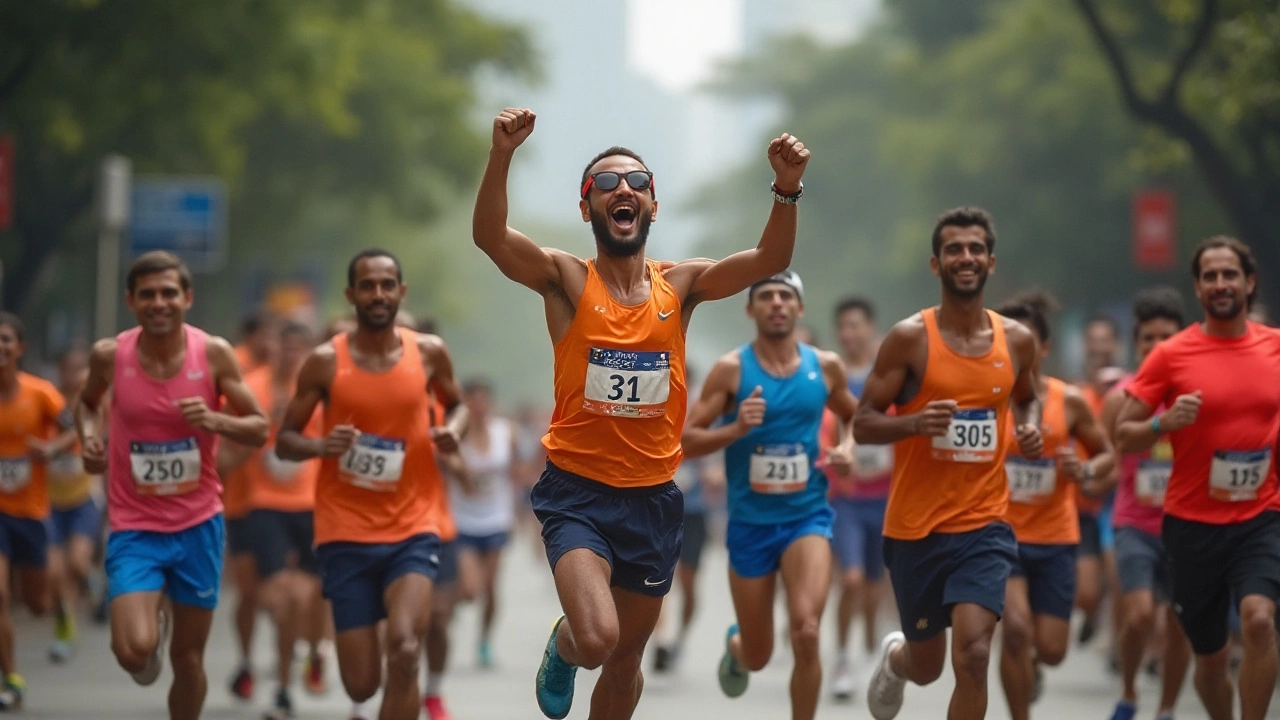
Scientific Studies on Runner Happiness
In the realm of marathon running, one of the most compelling aspects to explore is whether the grueling training and race itself contribute significantly to a runner's sense of happiness. Various scientific studies have attempted to unravel this intriguing connection. A notable research project conducted by a team at Yale University found that people who participate in regular long-distance running reported higher levels of life satisfaction compared to non-runners. The study suggests that the discipline and commitment required for marathon training may enhance an individual's sense of achievement, thereby boosting happiness.
The impact of physical exertion on mental health has been a subject of scientific inquiry for decades. Studies focusing on the mental wellbeing of runners indicate a substantial reduction in stress and anxiety levels. This phenomenon is frequently attributed to the release of endorphins during and after running. These natural mood elevators, often credited for the 'runner's high,' create a euphoric feeling that can lead to increased long-term happiness. Dr. John Ratey, a renowned psychiatrist, mentions in his book "Spark: The Revolutionary New Science of Exercise and the Brain," that aerobic exercise, such as running marathons, improves brain function and mental health, providing a 'cognitive boost' along with happiness.
Another significant study published in the 'Medicine & Science in Sports & Exercise' journal highlights that the social aspect of running in groups, which is common among marathon runners, might also play a pivotal role in enhancing happiness. The research found that runners who trained with others experienced a sense of community and connectedness that warded off loneliness and enriched their social lives. This data emphasizes how camaraderie and shared goals can add layers of satisfaction, providing runners with not just a physical outlet but an emotional and social one as well.
Yet another angle explored by scientists is the psychological resilience developed through enduring the physical challenges of marathon preparation. This resilience often spills over into other life aspects, equipping runners to handle stress and adversity effectively. A study by the University of Toronto assessed the coping strategies of marathon runners and concluded that their enhanced ability to manage challenges directly contributed to a heightened state of happiness. Interestingly, the researchers observed that these athletes often carried a positive outlook which was deeply intertwined with their running endeavors.
The evidence supporting the link between marathon training and increased happiness is substantial, but like all areas of scientific inquiry, it leaves room for further exploration. A nuanced consideration of individual experiences, the subjective nature of happiness, and lifestyle factors beyond running is essential. As research continues to delve deeper into this relationship, it offers us a fascinating glimpse into how a seemingly physical discipline can enrich one's inner emotional landscape.

Incorporating Happiness Strategies into Training
Tapping into a runner's happiness involves more than just crossing the finish line with aching muscles. The journey to achieving that state of contentment lies in how you shape your marathon training to enhance not only physical endurance but also emotional wellbeing. It's about interweaving mental and physical growth into a holistic plan that amplifies happiness.
One of the key strategies is setting meaningful goals. While achieving personal bests is exhilarating, setting small, incremental goals can provide continuous encouragement. Applaud yourself for those little victories, whether it's shaving a few seconds off your mile time or mastering a challenging trail. Achieving these bite-sized targets ensures a steady stream of happiness-inducing dopamine.
Another effective tactic is practicing mindfulness during your runs. Being present and engaged as you move through landscapes makes the act of running more meditative, offering peace away from life's chaos. Focus on rhythmic breathing, the sound of your feet on the ground, and the scenery around you. Meditation, even while active, helps reduce stress and boost happiness.
Incorporating social elements into your marathon training may amplify joy. Whether it's joining a local running club or participating in virtual running communities, connecting with fellow runners brings a sense of camaraderie and support. It’s an opportunity to share experiences, tips, and encouragement. You become part of a shared journey, which can be profoundly rewarding.
Feeling the Progress
"The race always hurts. Expect it to hurt, but know with every mile comes invaluable growth." — Ann Trason, ultrarunner.
A great part of finding joy in the running journey is recognizing progress. Creating a diary or tracking progress with apps allows runners to see tangible improvements, providing a mood-lifting affirmation of efforts invested. In the long run, documenting miles logged, weight lost, personal milestones achieved, all fuel that inner fire of accomplishment.
Nourishing your body correctly can also play a role in increasing happiness levels. A balanced diet rich in proteins, carbohydrates, and good fats provides the energy needed for marathon training, while certain foods, like bananas and berries, are known to enhance mood. Hydration, often overlooked, is equally important for maintaining energy levels and mental clarity.
Routine and Recovery: Keys to Joy
In the rush of daily schedules, crafting a routine that prioritizes rest as much as effort is vital. Injuries and burnout can quickly derail happiness, turning running into a chore. Thus, integrating adequate rest days, cross-training, and gentle yoga or stretching sessions ensures that the body and mind recuperate and stay invigorated.
A balanced routine is not only about the runs themselves but also includes recovery strategies. Embracing recovery techniques, from foam rolling to massage, can enhance physical restoration while offering mental rejuvenation. These practices keep soreness at bay and cheerfulness within reach.
When you combine structured goals, social ties, mindfulness, and a balanced routine, you create a training life that not only strengthens your legs but nourishes your spirit. Being mindful of these strategies can open up voids for happiness to flourish naturally, making the path to the marathon as thrilling as the finish line itself.
